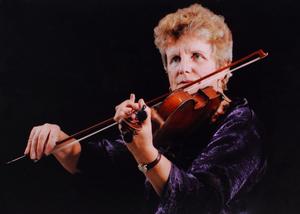

Colleen Trenwith came from New Zealand to ETSU's CASS music program.
JOHNSON CITY, Tenn. -- The story of New Zealand's most recognized fiddle player's journey to the mountains of Southern Appalachia, and to East Tennessee State University, is both familiar and extraordinary: familiar because it is a story of music's allure; extraordinary in that Colleen Bain Trenwith did not set out to be a fiddle player at all.
In 1954, at the age of eight, Colleen began violin lessons in Newtown, a suburb of New Zealand's capital, Wellington. By the sixth form - the final two years of secondary schooling when students are ages 16-18 - she was playing in the Wellington Youth Orchestra and the National Youth Orchestra.
"Music was always a part of my life," she says. "My father was a pianist. He was a person who was always at the center of any party. He played the old time sing-along songs, and always gathered people around. If there was a piano in the place, he'd be there.
"I had three brothers. One of my brothers and I played instruments; the other two were singers. We performed as a family. As Presbyterians, we were very involved in the music of our church."
She traveled north to Hamilton Teachers' College to study to be a music teacher. There she met Paul Trenwith (her future husband) and his friend from high school, Alan Rhodes. Paul and Alan introduced Colleen to the intricacies of bluegrass music.
The liner notes to their band's album, the Hamilton County Bluegrass Band 1968 to 1973 (Colleen, Paul, Alan, David Calder, Len Cohen and Sandy McMillin) gives an understanding of how seismic their influence was: On the wall at the Devonport Folk Club is a chart showing the course of the '60s - a time-line of the political, social, and cultural events of those turbulent times.
Around 1968, the chart lists the Beatles, Bob Dylan, and the Hamilton County Bluegrass Band, together. The surprise is not just that this New Zealand country music group should be mentioned in the same breath as those world-famous names, trail-blazers in folk and pop. The interesting point is that, in the minds of many New Zealanders, the years when HCBB rode high in the public's estimation were flashpoint years, and bluegrass music was the touchstone of an era."
Colleen continues, "We were asked to be on a TV series called The Country Touch. It was on every Wednesday night from 7:30-8. The show was our band performing, and backing up all the other singers and playing for the square dance that was a regular feature. In that way, I became very well-known as a fiddle player because there was only one channel on TV at the time, and it was in black and white!"
In the mid-seventies the HCBB laid down their instruments to raise families. By this time, the band had done more than 50 TV shows, recorded nine albums, performed at hundreds of concerts, been featured in a National Film Unit "short," and written jingles. They had toured extensively, including having played for Bill Monroe on his show at the Grand Ole Opry.
Music never left Colleen. Even while raising four sons (not surprisingly, all of whom are musical), she found time to perform and teach fiddle. One of her students from that time, a western North Carolinian who had come to New Zealand to study dairy farming, became a personal friend. Off and on between 1993 and 2006 Colleen traveled to Asheville, N.C., to visit that friend and others.
"During my trips to this country, my friends would take me to see different parts of Appalachia. I developed a fascination for the place, because every single place I visited had a story to tell."
Her fascination with Appalachia and her love of the region's music prompted her to make inquiries about studying bluegrass, old time and country music at ETSU. With the help of a Creative New Zealand grant and a Public Performance Scholarship from ETSU, Colleen fulfilled her dream to immerse herself in Appalachian culture.
"In my previous visits, I had only stayed for no more than three weeks at a time. I wanted to see the seasons change; to really get to know people in the region; and to better understand the history of Appalachia. It's all been very exciting to me."
It is also very exciting for the ETSU Center for Appalachian Studies and Services (CASS) to have one of New Zealand's creative treasures in its midst.
For further information, call the CASS Bluegrass, Old Time and Country Music Program at 423-439-7072.